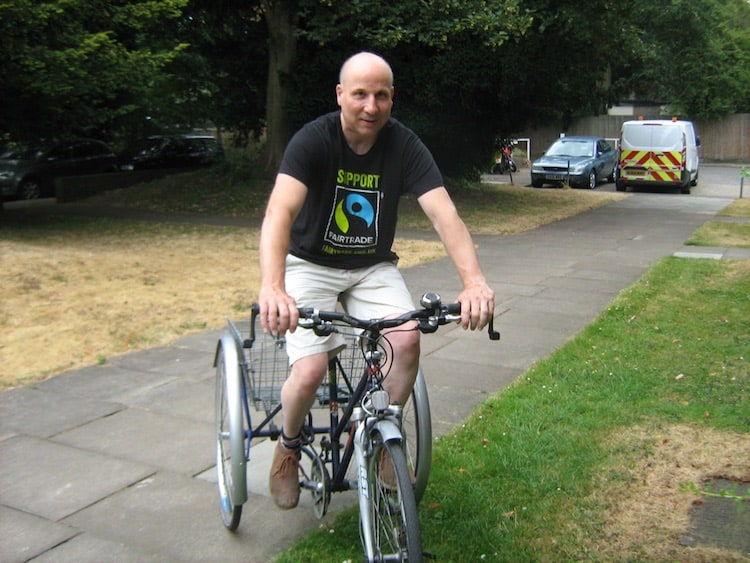Life on three wheels
Like most people, I learned to cycle as a child. I think my first bike (at age 6) had ‘Gunfighter’ printed on it, and I remember my older brother telling me that it was the fastest bike in the world (Gunfighter – Westerns), which I believed and told everybody (so why was everybody overtaking me!?). I progressed to a Raleigh Chopper, which was one of the in-bikes in the 1970s, and started riding further afield with friends.
At 12 years old I was struck by a brain tumour, and after hospital and rehabilitation I was left with difficulty with movement and my sense of balance. I still believed that I was going to recover completely, and asked my parents to buy me a racing bike for my 14th birthday. It then became very difficult to participate in any sport and it seemed like that was the end of cycling for me.
Several years later I was on holiday in Canada when somebody challenged me to take up cycling again. On the return home I started trying to learn to cycle on two wheels again (it soon became obvious that I would need completely empty roads to myself for this to become a reality!)
I can’t remember why, but I bought an old tricycle and, when I tried cycling it, it worked – I was able to cycle again! The journey from my first 3-gear trike to my current 21-gear trike has been an interesting one! Being able to cycle has been a huge factor in improving my health, both physically and mentally, and I really enjoy the freedom that it brings.

I would advise anybody with a disability not to give up. There are people who can help. Cyclists with disabilities are growing in number and charities such as Wheels for Wellbeing are available. I first heard of Wheels when working for Lambeth NHS. They came to do a presentation at my workplace and their manager at the time saw my tricycle parked. We got chatting and I was hooked and immediately became a volunteer. Since then I have helped out at events, spoken at meetings, joined rides and raised money for a brilliant charity that can change people’s lives for the better.
I suppose that I am blessed in that I am quite a strong-minded person, because there have been some difficult barriers to overcome in order for me to return to cycling. I think the biggest barrier for cyclists with disabilities is the cost of cycles, although a growing market is helping to reduce this. I bought my first trike second-hand for £180 (reasonable for a 3-gear, around town trike). I bought my current trike, also second-hand, for a fraction of the £3,500 the previous owner had paid for it.
A second factor is space and safety on the road. Many non-standard cycles are large and need wider and protected cycle lanes. There are many cycle lanes which I am unable to use, whilst painted cycle lanes on a road don’t always stop drivers from driving in them!
Thirdly, it’s knowing that there is help and support available. Sometimes you need a stroke of luck to find the right kind of support. I have been stopped many times and have been able to give people advice and information regarding cycling for people with disabilities.
May our wheels go round forever!
